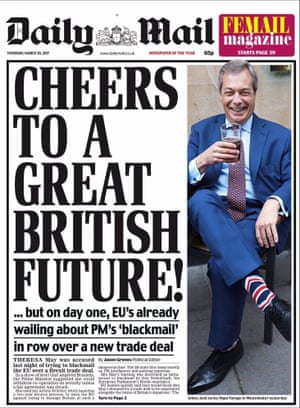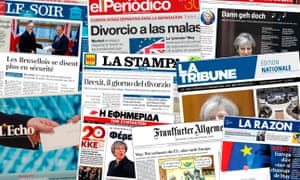
European newspapers greeted the formal start of Britain’s exit from the EU with a mixture of pain, puzzlement and predictions that the coming two years of negotiations could get nasty – especially if the UK resorts to “blackmail” over security cooperation.
In Britain, a week after the attack on Westminster, most of the UK press saw Theresa May’s speech triggering article 50 as a direct threat to the EU over fighting terror.
Le Monde in France said May’s letter triggering article 50 was not a good start: It “alternated between concessions to the EU and threats”, demanding a special future relationship but warning of a reduction in defence and security cooperation if she did not get it.
“Instead of responding to the EU27’s expectations by informing them of her intentions as regards the divorce she is requesting,” the paper said, “Britain’s prime minister stressed … a new ‘deep and special partnership’, which Europe does not want to discuss until the exit bill and details are settled.”
And for the UK, that partnership must cover not just economic relations but the continent’s security, Le Monde said: “What a surprise … This is barefaced blackmail: if you don’t open your single market to our products, the UK will cease police, intelligence and anti-terror cooperation.”
Germany’s Die Welt said the final outcome of Brexit would not be known for years and would probably turn out to be “somewhere between apocalypse and wonderland”, but warned that the “two-year marathon” facing Britain was the country’s “toughest race since the second world war”.
It identified four key stumbling blocks, which could cause “the entire process to collapse at an early stage”: money, the rights of EU and UK citizens, the role of the European court of justice – and the issue of security cooperation.
NRC in the Netherlands said despite her assurances to the contrary, May would be hobbled in the coming talks by the “zealotry of the extreme Brexiteers”, Scottish opposition and a dawning realisation among voters that Brexit “also, and to a great extent, means giving up control, not taking it back”.
NRC, too, said the letter contained a clear threat. But it questioned whether it had any weight: “An insecure Europe rapidly becomes a menace for the country on the other side of the Channel.”
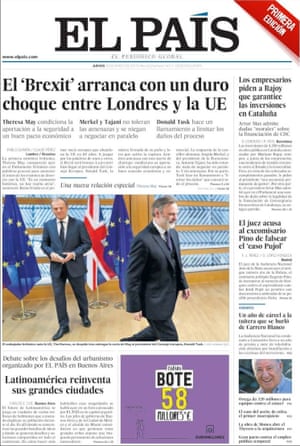
Spain’s El País waxed __more lyrical, saying the “time of poetry is over, and now it is the turn of hard prose”. Sir Tim Barrow’s delivery of the article 50 letter marked the start of negotiations that took both Britain and the bloc into “uncharted territory … A colossal project for which there is no precedent.”
It said Britain’s stance was relatively clear: “Basically, its priorities are to end the free movement of people between the UK and the EU, and to leave the jurisdiction of the European court of justice. May acknowledges and accepts that these two demands involve the exit from the common market.”
El País was heartened by what it saw as a “softening of language” on the UK’s part, moving from “no deal is better than a bad deal” to “We must minimise as much as possible the disturbance on both sides.”
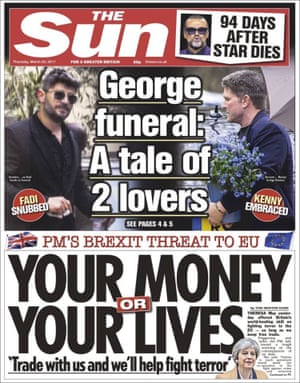
The Sun summed up May’s speech as a highwayman threat: “Your money or your lives,” in reference to the security ultimatum. The “PM’s Brexit threat to EU – Trade with us and we’ll help fight terror,” it went on, trumpeting “Britain’s world-beating skills on fighting terror”.
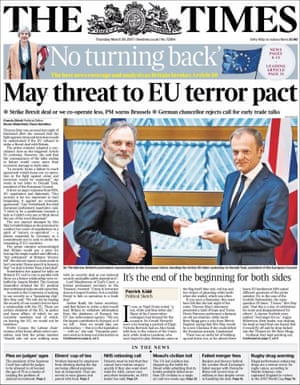
This was not a rogue reading by Britain’ biggest selling daily: its sister title the Times took the same line with a front page headline that read: “May threat to EU terror pact.” The Telegraph’s story took the same line, while its treatment offered the Tories the closest they will ever get to a souvenir edition for the Brexit letter itself.
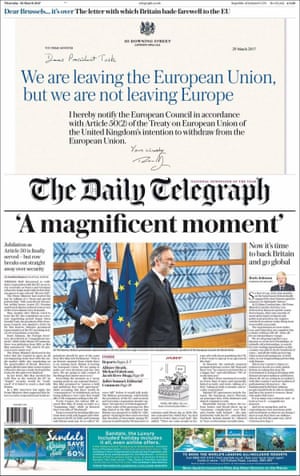
The Telegraph, once so proud of its news coverage, went for a descriptive rather than newsy headline. “A magnificent moment,” was the headline, with the entire top half of the one remaining mainstream daily broadsheet given over to the letter itself on Downing Street headed notepaper, signed by May. The standfirst talked of “Jubilation as article 50 is finally served”.
In many ways, the Times offers the closest newspaper parallel to May herself. Both offered weak support for remain, remember, against the known preference of their masters; in the paper’s case Rupert Murdoch and for May, the great British people. A surface calm and sense of balance for both can never quite remove the internal struggles within.
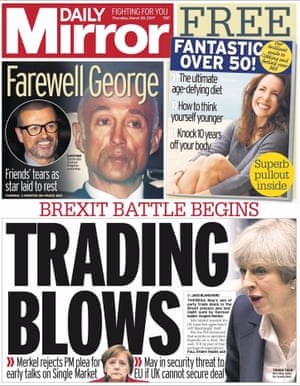
The Times and the Sun were unusual yesterday in putting a picture of May on their front pages. Only the Mirror, in relatively muted coverage, used a larger picture of her rather than the two men delivering and receiving the letter itself.
May’s threat provoked the European negotiators of course, a fact that was seized on by both the Mail and the Guardian. The way both papers portrayed that reaction was completely different, unsurprisingly.
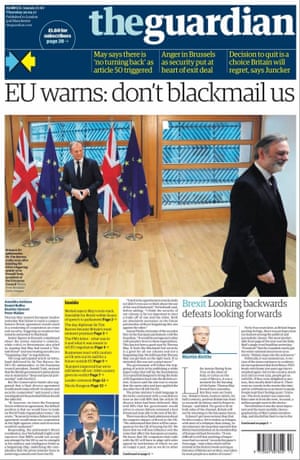
While the Guardian ran “EU warns: don’t blackmail us” above a picture of a lonely-looking president of the European council, Donald Tusk, gazing at the departing back of Barrow, Britain’s EU ambassador, exiting stage left, the Mail could not resist a full-page picture of the former Ukip leader Nigel Farage in his trademark pose, gurning over a pint of ale while wearing union jack socks.
“Cheers to a great British future,” was the triumphalist headline.
